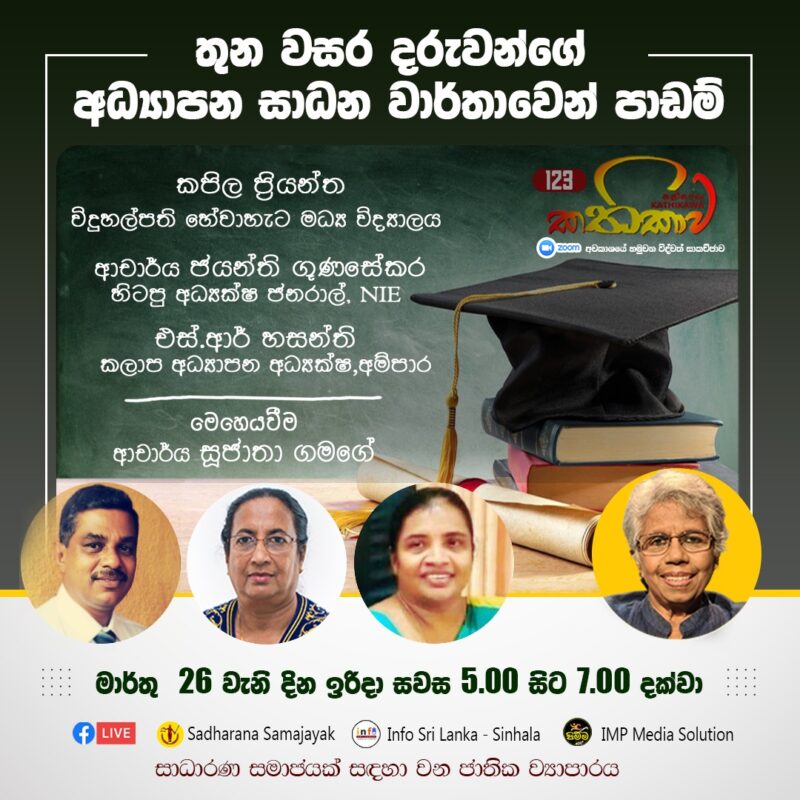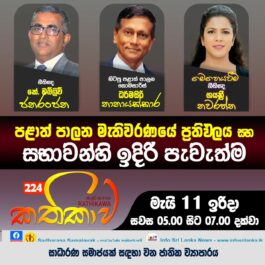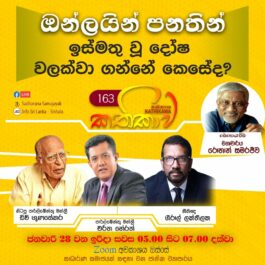තුන වසර දරුවන්ගේ අධ්යාපන සාධන වාර්තාවෙන් පාඩම් | March 26, 2023
FULL VIDEO is at https://www.facebook.com/nationalmovementforsocialjustice/videos/613118673624226
MODERATED BY Dr. Sujata Gamage
PANEL:
Dr. Jayanthi Gunasekera, Director General (Former), National Institute of Education
Ms. S. R. Hasanthi, Zonal Education Director, Amapara
Mr. Kapila Priyantha, Principal Hewahata Central College
RELATED REPORTS
Download the 2022 report here ; Download a 2015 report by NEREC on education achievement of Grade 4 student here
INTRODUCTION in sinhala and English
මෙම කතිකාවට නිමිත්ත පසු ගියදා පලකෙරුනු “ ශ්රී ලංකාවේ තුන්වන ශ්රේණියේ සිසුන්ගේ සාක්ෂරතාවය හා ගණිතය පිළිබඳ මූලික කුසලතා සාධනය ඇගයීම” යන වාර්තාවයි.
2020-2021 කාලය තුල බරපතල ලෙස පැවතුනු කොවිඩ් වසංගතය නිසා ලංකාවේ පමණක් නොව ලෝකයේම දරුවන්ගේ අධ්යාපනය කඩා කප්පල් වුනා. එම නැතිවුන අධ්යාපනය නැවත දරුවන්ට ලබා දීමේ පළමුවැනි පියවරක් ලෙස සිසුනගේ ඉගෙනුමේ හිඟ පාඩුව පිළිබඳ ඇගයීම් කරන ලෙස යුනෙස්කෝ ලෝක අධ්යාපන ආයතනය රටවල් වලට ආයාචනය කර සිටියා. ඒ අනුව පමාවී හෝ අපගේ අධ්යාපන අමාත්යංශය පසුගියදා පල කරන ලද වාර්තාව ලංකාවේ අධ්යාපන සාධනය ඇගයීම පිළිබඳ වැදගත් සංවාදයකට මුල පුරන බව අපගේ හැගීමයි.
එම වාර්තාවට අනුව 2021-2022 වසර වලදී තුන වසර දරුවන්ගෙන් අත්යවශ්ය සාක්ෂරතාව ඇත්තේ 14% කට පමණි. ගණිත කුසලතා ඇත්තේ 15% කට පමණි. මේ දරුවන් කොවිඩ් නිසා විධිමත් පළමුවන හෝ දෙවන වසර අධ්යාපනයක් ලබා නොමැති දරුවන් වේ. නමුත් වසංගතයට පෙර තත්වය පිළබඳව සම කළ හැකි දත්ත නැති නිසා මෙම ප්රතිඵලය කෙලින්ම කොවිඩ් වසංගතය හා සම්බන්ධ කර නැත.
මෙය ලංකාවේ ඇගයීම් ඉතිහසයේ සන්ධිස්ථානයක් විය හැකියි. .
උදාහරණ ලෙස තව දුරටත් ජාතික විභාගයක්ශි වන පහ වසර ශිෂ්යත්ව විභාගෙන් සිසුන් 70%ක් පේපර් දෙකටම ලකුණු 35 ට වඩා ගත්තා වගේ ඉලක්ක්යක් තබාගෙන ඇඟ බේර ගන්න බැහැ. තිරසාර සංවර්ධන ඉලක්කය කියන්නේ හැම දරුවෙක්ම, ඒ කියන්නේ සිසුන්ගෙන් 100% ක්ම, මූලික සාක්ෂරතා හා ගණිත කුසලතා වලට 100% ලබා සිටීමයි.
ඉදිරියට යෑමේදී මෙම වාර්තාව ප්රශ්න කිහිපයක් මතු කරනවා :
- කොවිඩ් නැති තත්වයක් තුල මේ බලාපොරොත්තු වන කුසලතා 100% හෝ ආසන්නයට තිබෙන්නට තිබුනාද?
- අපේ දරුවන්ට අත්යවශ්යයි සැලකෙන නිපුණතා නම් කර ඇතත් ඒවා ගැන විධිමත් ජාතික ඇගයීමක් තියනවාද?
- ශිෂ්යත්ව විභාගයෙන් මෙම අතවශ්ය කුසලතා පිලිබඳ යම් ඉඟියක් ලැබෙනවද? එසේ නොමැතිනම් එම විභාගය පාසැල් වල කාර්ය සාධනය පිලිබඳ මිම්මක් ලෙස යොදා ගැනීම හරිද??
- කොවිඩ් අර්බූදයට වඩා දිගු කාලීන අර්බූදයක් වන ආර්ථික අර්බූදයක් හමුවේ අප විසින් ඉදිරියට යා යුත්තේ කෙසේද? අපගේ අධ්යාපන සාධන ඇගයීම් කෙසේ වෙනස් විය යුතුද? තව දුරටත් ළමයින් හලන්න යොදා ගන්න ශිෂ්යත්ව විභාගය, සාමාන්ය පෙළ හා උසස් පෙළ විභාග එසේම පැවැත්විය යුතුද?
The reason for this KAthika is the report “Evaluation of foundational skills in literacy and numeracy of third grade students in Sri Lanka” that was published the other day. https://moe.gov.lk/wp-content/uploads/2023/03/Report-final-numaric.pdf
During the Covid epidemic of 2020-2021, the education of children not only in Sri Lanka but in whole the world was disrupted. UNESCO has been appealing to all countries to evaluate the learning losses of their students as a first step in the recovery process. Although long overdue, the publishing of a report on the subject is highly appreciated.
According to the report, only 14% of students in Grade three have foundational skills in literacy. Only 15% have foundational skills in numeracy. These children are those who may have not received a full course of formal first or second-year education due to Covid. Unfortunately the impact of covid in this astonishingly low numbers cannot be discerned because there is no comparable pre-covid data.
Yet the report is a landmark in evaluation of student learning in Sri Lanka. Hitherto national exams have focused on narrow goals. For example the goalpost of the Grade Five scholarship exam has been to increase the “Percent of student receiving thirty-five or more marks in both papers”. But the new indicators tied to sustainable Development Goal 4.1.1 is simple – 100% of students have to show 100% on foundational literacy and numeracy skills. No more hand-waving. We now know what exactly we need to do.
As we go forward we need to resolve many issues. For example:
- What Would these expected skills have been in a non-Covid situation?
- Skills that are considered essential for our children have been named, but is there a formal national assessment of them?
- Does the scholarship exam give any indication of these essential skills? Otherwise, is it right to use the exam as a measure of school performance??
- How should our educational achievement assessments change, specially in light of costs of conducting national examinations – two with 50+subject, in three media with two papers for each subject?



